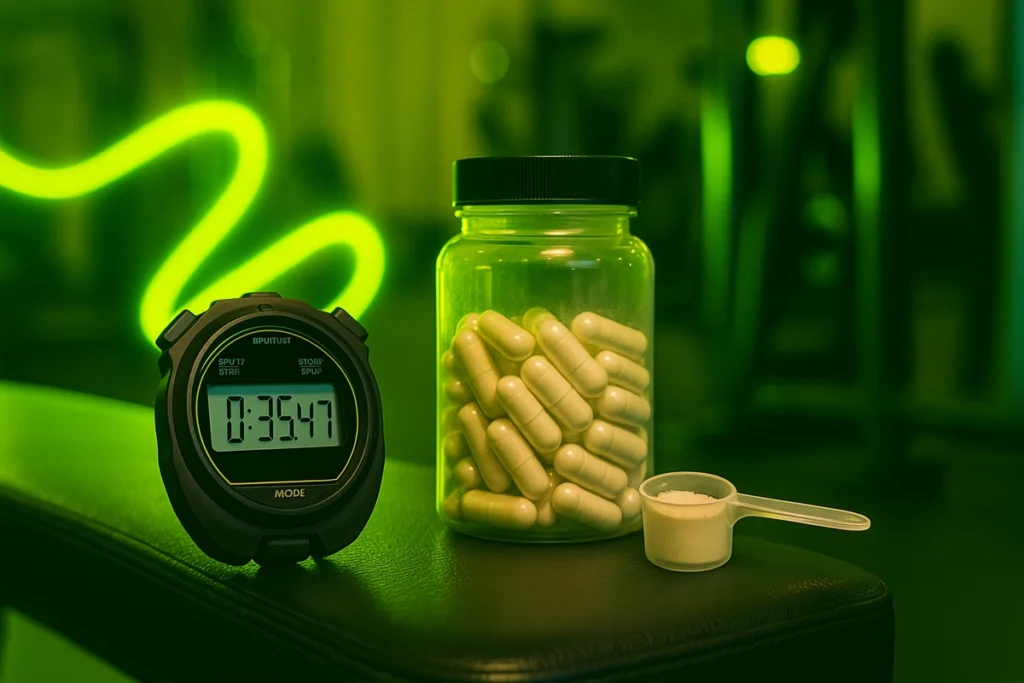Struggling to stay mentally sharp during long workouts? You’re not alone.
Whether it’s zoning out halfway through a tough leg day or losing focus during high-volume sets, mental fatigue can kill your performance — even when your muscles still have gas left in the tank.
That’s where caffeine steps in. Known for its energy-boosting power, caffeine also plays a key role in enhancing mental focus, alertness, and mind-muscle connection — especially when workouts stretch beyond the 60-minute mark.
In this article, I’ll break down how caffeine really works for mental clarity in the gym, the best timing and dosage, and how I’ve personally used it to stay laser-focused through demanding training sessions.
Table of contents
- Does Caffeine Help Mental Focus in Long Workouts?
- How Caffeine Enhances Mental Focus During Training
- Best Caffeine Timing for Long Workout Sessions
- How Much Caffeine Do You Need for Focus?
- Caffeine Sources: Pills vs. Coffee vs. Pre-Workout
- Side Effects and Mental Burnout Risks
- Who Should Avoid Caffeine for Mental Focus?
- Conclusion: Is Caffeine Worth It for Mental Focus in Long Workouts?
Does Caffeine Help Mental Focus in Long Workouts?

Yes — caffeine absolutely helps boost mental focus during long workouts.
As a fitness coach who’s spent years both training and guiding clients through extended lifting or cardio sessions, I’ve seen firsthand how caffeine can sharpen concentration, delay fatigue, and keep your head in the game from start to finish.
The key is using it smartly, not excessively.
How Caffeine Enhances Mental Focus During Training

Caffeine works by blocking adenosine, the brain chemical responsible for making you feel tired.
This leads to increased alertness, better reaction times, and improved mental clarity — all of which are crucial when you’re pushing through high-volume sets or long endurance sessions.
From my own experience, especially during tough 90-minute push or leg days, caffeine helps me stay locked in.
Without it, I’ve caught myself mentally drifting or losing that “drive” halfway through the workout.
If you want to understand more about how caffeine affects your brain and performance, check out this detailed article: Caffeine vs. Pre-Workout: What’s Better for Focus?
Best Caffeine Timing for Long Workout Sessions

The sweet spot is about 30–40 minutes before your session.
That gives it time to kick in just as you’re warming up and getting into the heavier sets.
For longer sessions (90 minutes or more), sipping a black coffee mid-workout can help maintain that mental edge without overloading your system.
This strategy has saved me plenty of times during intense supersets or complex barbell routines when mental fatigue hits before physical fatigue does.
To learn more about smart timing, see: Best Time to Take Caffeine Before a Workout
How Much Caffeine Do You Need for Focus?

For most people, 150–200 mg hits the mark — enough to boost mental performance without causing jitters or a crash.
I personally cap it at 250 mg max and always pair it with a light pre-workout meal to avoid nausea or restlessness.
One of my clients, Lucas from Brazil, found that 100 mg caffeine tabs gave him a clean, focused boost without affecting his sleep or making him anxious — which is exactly what we aim for.
Need help with dosing for fat burning or mental clarity? Read: Caffeine Dosage for Focus & Fat Burning
Caffeine Sources: Pills vs. Coffee vs. Pre-Workout

Each has its pros and cons:
- Coffee: Natural, easily accessible, and customizable. Great for casual use.
- Caffeine pills: Precise dosing, zero calories. Best for those who don’t want the liquid volume.
- Pre-workouts: Often contain other ingredients like beta-alanine or citrulline. Some are great — others overloaded.
Personally, I stick to black coffee or a low-stimulant pre-workout with a moderate dose.
It gives me the focus I need without the post-workout crash.
Here’s a great breakdown of options: Caffeine Pills vs. Coffee for Gym Performance
And if you prefer clean fuel, this guide might help: Natural Caffeine Sources for Pre-Workout Energy
Side Effects and Mental Burnout Risks

Too much caffeine can backfire.
I’ve learned this the hard way — especially during my early training years when I’d take pre-workout on an empty stomach.
The result? Jitters, anxiety, and even nausea halfway through my sets.
It’s also easy to become dependent, which is why I take breaks and never use caffeine on rest or deload days. That way, it stays effective when I actually need it.
If you’re noticing reduced effects, it may be time to read: How to Reset Your Caffeine Tolerance
Also, don’t ignore the potential negatives: Caffeine Side Effects of High Doses
Who Should Avoid Caffeine for Mental Focus?

If you’re training late at night or are sensitive to stimulants, caffeine might do more harm than good.
One of my female clients, Sandra from Germany, found that pre-workout caffeine affected her sleep even when taken six hours before bed.
She switched to green tea and noticed better energy and zero sleep disruption.
If you’re into fasted cardio, this article breaks it down well: Caffeine Before Fasted Cardio – Does It Help?
Conclusion: Is Caffeine Worth It for Mental Focus in Long Workouts?

Absolutely — when used mindfully.
Whether you’re hitting a demanding strength session or grinding through cardio, caffeine can help you stay sharp, engaged, and motivated.
Just remember: the goal is focus, not a false sense of energy.
Use it to support your training — not to compensate for lack of rest, food, or proper programming.
And if soreness is a concern, there’s even evidence caffeine helps post-workout: Caffeine and Muscle Recovery: Reduce Soreness Naturally
Train smart, stay sharp — and make caffeine your ally, not your crutch.



Leave a Reply